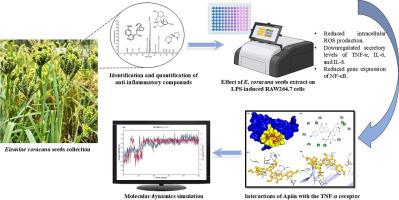Investigating the anti-inflammatory potential of Eleusine coracana (L.) Gaertn. Seeds on LPS-induced RAW264.7 cell line with in-silico analysis
IF 4
2区 农林科学
Q2 FOOD SCIENCE & TECHNOLOGY
引用次数: 0
Abstract
The purpose of this study is to evaluate the anti-inflammatory potential of the methanolic extract of Eleusine coracana seeds in RAW264.7 cells with in-silico analysis. The Phytoconstituents present in E. coracana seed extract were identified using GC–MS/MS and LC-MS/MS, and the results showed the presence of various anti-inflammatory compounds, including flavonoids, phenols, terpenoids, alkaloids, nucleosides, fatty acids, and their esters. Furthermore, LPS stimulation in RAW264.7 cells increased the ROS production from 23.36 ± 0.22 (control) to 43.35 ± 0.54, while E. coracana seed extract significantly reduced ROS to 31.23 ± 0.66 and 30.56 ± 1.35 at 10 and 50 μL/mL concentrations, respectively. Similarly, secretory levels of IL-6, IL-8, and TNF-α increased to 52.14 ± 6.06, 90.38 ± 0.54, and 2739.55 ± 3.85 pg/mL, respectively, in LPS-treated cells. However, treatment with E. coracana seed extract reduced these cytokines to 38.57 ± 5.05, 79.48 ± 0.72, and 2512.73 ± 7.07 pg/mL at 10 μL/mL, and further to 28.57 ± 1.01, 74.35 ± 0.72, and 2473.64 ± 28.92 pg/mL at 50 μL/mL. NF-κB expression was also suppressed, decreasing from 1.66 ± 0.10 in LPS-treated cells to 1.55 ± 0.14 at a 10 μL/mL concentration of E. coracana seed extract. Additionally, in-silico analysis showed that apiin exhibited the most favorable binding affinity (−7.2 kcal/mol) toward the key inflammatory target (TNF-α) when compared with other phytochemicals. Molecular dynamics simulations over 100 ns further confirmed the stability of the apiin-TNF-α complex, with both protein and ligand remaining stable throughout the simulation. Overall, this study highlights the first evidence from a cell line model and in silico methods that the methanolic extract of E. coracana seeds exhibits significant anti-inflammatory properties, which offer a novel natural approach to addressing inflammation-related diseases.

coracana (L.)的抗炎作用研究Gaertn。lps诱导RAW264.7细胞株上的种子与硅分析
本研究的目的是通过硅晶分析来评价香豆籽甲醇提取物对RAW264.7细胞的抗炎作用。采用GC-MS /MS和LC-MS/MS对芦笋籽提取物中的植物成分进行了鉴定,结果表明芦笋籽提取物中含有黄酮类、酚类、萜类、生物碱、核苷类、脂肪酸及其酯类等多种抗炎成分。此外,LPS刺激RAW264.7细胞的ROS产量从23.36±0.22(对照)增加到43.35±0.54,而10 μL/mL和50 μL/mL浓度下,coracana种子提取物的ROS产量分别减少到31.23±0.66和30.56±1.35。同样,在lps处理的细胞中,IL-6、IL-8和TNF-α的分泌水平分别增加到52.14±6.06、90.38±0.54和2739.55±3.85 pg/mL。而在10 μL/mL处理下,这些细胞因子分别为38.57±5.05、79.48±0.72和2512.73±7.07 pg/mL,在50 μL/mL处理下分别为28.57±1.01、74.35±0.72和2473.64±28.92 pg/mL。NF-κB的表达也受到抑制,在10 μL/mL浓度下,lps处理细胞的NF-κB表达从1.66±0.10降至1.55±0.14。此外,计算机分析表明,与其他植物化学物质相比,蜂素对关键炎症靶点(TNF-α)的结合亲和力最高(−7.2 kcal/mol)。超过100 ns的分子动力学模拟进一步证实了apiin-TNF-α复合物的稳定性,在整个模拟过程中,蛋白和配体都保持稳定。总的来说,这项研究强调了细胞系模型和计算机方法的第一个证据,即棘豆种子的甲醇提取物具有显著的抗炎特性,这为解决炎症相关疾病提供了一种新的自然方法。
本文章由计算机程序翻译,如有差异,请以英文原文为准。
求助全文
约1分钟内获得全文
求助全文
来源期刊

Journal of Functional Foods
FOOD SCIENCE & TECHNOLOGY-
CiteScore
9.60
自引率
1.80%
发文量
428
审稿时长
76 days
期刊介绍:
Journal of Functional Foods continues with the same aims and scope, editorial team, submission system and rigorous peer review. We give authors the possibility to publish their top-quality papers in a well-established leading journal in the food and nutrition fields. The Journal will keep its rigorous criteria to screen high impact research addressing relevant scientific topics and performed by sound methodologies.
The Journal of Functional Foods aims to bring together the results of fundamental and applied research into healthy foods and biologically active food ingredients.
The Journal is centered in the specific area at the boundaries among food technology, nutrition and health welcoming papers having a good interdisciplinary approach. The Journal will cover the fields of plant bioactives; dietary fibre, probiotics; functional lipids; bioactive peptides; vitamins, minerals and botanicals and other dietary supplements. Nutritional and technological aspects related to the development of functional foods and beverages are of core interest to the journal. Experimental works dealing with food digestion, bioavailability of food bioactives and on the mechanisms by which foods and their components are able to modulate physiological parameters connected with disease prevention are of particular interest as well as those dealing with personalized nutrition and nutritional needs in pathological subjects.
 求助内容:
求助内容: 应助结果提醒方式:
应助结果提醒方式:


